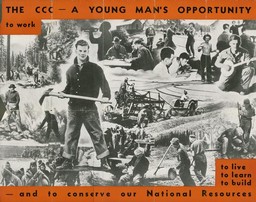
I had the good fortune to be on vacation last week during the height of the Debt Ceiling Hostage Crisis, and so spent much time camping, hiking, and kayaking in the plains, forests, and hills of Nebraska and South Dakota, rather than obsessively reading news off of the web and wanting to scream until my voice box shredded. Instead of following the minute-by-minute reports, my sojourn into nature prompted some deep reflection and some surprisingly relevant tourist destinations.
All along our travels, we found constant reminders of the New Deal and its legacy of public works. Our first stop was camping in the Nebraska National Forest, located near Halsey. (Yes, that's right, a national forest in the treeless Nebraska Sand Hills. It was a successful experiment in learning to grow trees on the arid plains.) Although the forest began in the Progressive Era, the Civilian Conservation Corps made a great number of improvements on it, turning it from a laboratory for forestry into a great place for camping. Growing up, my family often stopped there on our trips west, and enjoyed picnic lunches in the shade, and I never knew that the CCC had made it all possible.
Further down the road, we stopped at Fort Robinson, in northern Nebraska, another great site that benefited from CCC labor. Later on we visited the magnificent Wind Cave in the Black Hills, and found out that the cement walkway that allowed larger groups of tourists to visit had been built in the 1930s by, you guessed it, the CCC.
For those of you who don't know, the CCC was a New Deal program that hired unemployed young men to make improvements on public land. Although it is less well-known than the WPA, TVA, or PWA, it is near and dear to my heart because without the CCC, I might not be here. My grandfather lost his farm in the mid-1930s, and found work through the CCC, which may very well have saved his life. It makes me proud that he was part of something that created lasting places for his grandchildren and great-grandchildren to enjoy. However, it also made me sad that in the midst of our greatest economic calamity since the Great Depression, we are not putting the unemployed to work by building up public works, we are instead putting people out of work by gutting our public institutions. Today we have the power to create a new CCC, to get the jobless back to work through public works, and to create lasting parks, pools, roads, and bridges that future generations can benefit from.
Yet such a plan isn't even being discussed in the halls of power.
In many ways, the events in Washington this last week show that the spirit of the New Deal, and any sense that public institutions and the public good are things to be cherished, may finally have been squelched by the avaricious spirit of Reagan and his disciples. I wish that all the folks who live in supposed "red states" and enjoy the parks built with CCC labor every weekend thought a little deeper about how these cherished places came to be in the first place.
 It was also on vacation that my wife and I saw Captain America. We had spent a very hot and tiring day canoeing down the Niobrara River, and were in no mood to sweat and get eaten by bugs at the campground. Luckily, tiny Valentine, Nebraska, has a twin cinema, and we were able to cool off by watching one of the more adroit and entertaining superhero movies I've seen in awhile. (I must add, though, that the historical anachronisms, especially the portrayal of a racially integrated military and empowered women in WWII, are highly problematic. For more on this, read what Chauncey has to say.)
It was also on vacation that my wife and I saw Captain America. We had spent a very hot and tiring day canoeing down the Niobrara River, and were in no mood to sweat and get eaten by bugs at the campground. Luckily, tiny Valentine, Nebraska, has a twin cinema, and we were able to cool off by watching one of the more adroit and entertaining superhero movies I've seen in awhile. (I must add, though, that the historical anachronisms, especially the portrayal of a racially integrated military and empowered women in WWII, are highly problematic. For more on this, read what Chauncey has to say.)It seemed strangely appropriate to me that this film would be released when the American empire was about to die from a self-inflicted gunshot wound. As hokey as this sounds, I did like the fact that Steve Rogers was so willing to sacrifice himself for his country, since that sense of shared struggle and common good seem to be dead at a time when a political faction is willing to hold the nation's economic future hostage to win a presidential election. Our myths about World War II deemphasize the real divisions and fissures on the home front (Japanese Internment, Zoot Suit Riots, 1943 Detroit Riot, etc), but at least in many other times of crisis our leaders have been willing to stop acting like selfish children and work together for the common good.
Although Captain America is a product of Hollywood's globalized entertainment capitalism, it like the CCC sites was a potent reminder that things don't have to be this way. I am not confident that much will change, but the inspiration for a nation better committed to the public good, rather than the Teabagger ideology and its corporate sponsors, is waiting there for us to discover in our forests, caves, bridges, and swimming pools.
No comments:
Post a Comment